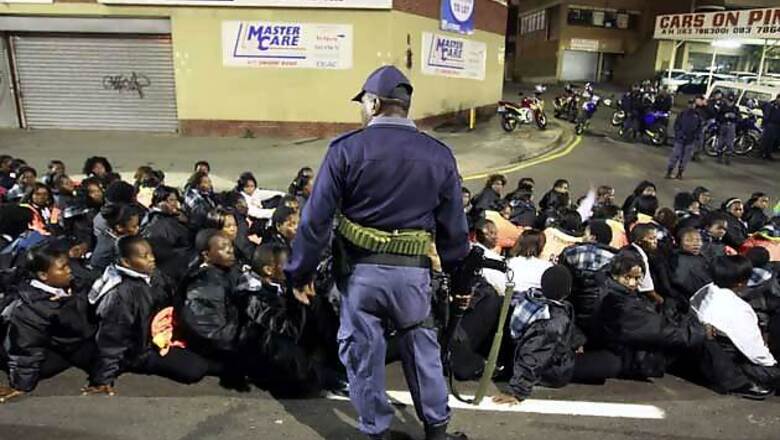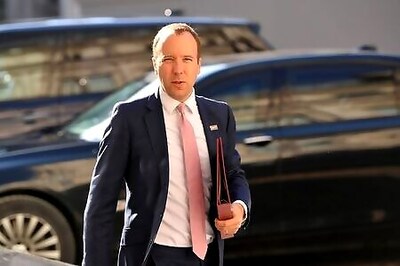
views
Johannesburg: Security stewards angered over low pay on Tuesday expanded their strike to five of the World Cup's 10 stadiums, forcing police to take over their duties in a bitter counterpoint to the generally festive tournament.
South African Police Services said it deployed about 1,000 extra officers in and around Johannesburg's Ellis Park to guarantee security for the night match between Brazil, one of tournament favorites, and North Korea.
On a day that carried winter's bite in this Southern Hemisphere nation, hundreds of stewards and security guards dressed in their black uniforms sang, whistled and chanted for more pay outside the stadium.
"Everywhere we go, we have rights," they sang as armed police kept watch but did not interfere. Later, bundled in knit caps and gloves, many of the strikers huddled in the raw wind and temperatures just above freezing, waiting for news about negotiations.
Police also took over security at stadiums in Durban, Cape Town and Port Elizabeth, where Portugal and Ivory Coast played to a 0-0 draw Tuesday.
Several hundred guards also walked off the job at Soccer City, the main World Cup stadium on Johannesburg's outskirts. There was no match there; its next game will be Thursday.
At issue is a wage dispute between the mostly black stewards and Stallion Security Consortium, a private, black-run company hired by World Cup organizers to provide stewards for five of the 10 venues. No wage problems have surfaced among stewards hired for the other five stadiums by South Africa's largest security company, Fidelity.
A woman who answered the phone at Stallion's Johannesburg office said company officials had gone to Ellis Park for a meeting about the dispute. No details of any negotiations were made public.
The dispute comes against a backdrop of jitters about security for the month-long tournament and numerous examples of screening for journalists and VIPs that has been more lax than at other major sporting events.
The strikers said they were being offered from 126 rand ($ 16.50) to 190 rand ($ 25), for 12- to 15-hour shifts. They were demanding at least 450 rand per day ($ 59).
Strikers accused the security company of mistreating them, feeding them only one meal during their shifts. They said many were unable to get home after getting off work late in the evening and were spending the night at bus and police stations in the frigid cold.
"We are freezing," said Denis Manganye. "They said this World Cup we would be getting money. Where is the money?"
In Durban, some 2,000 stewards protested over wages, calling on FIFA to confirm what they should earn for working at the tournament.
Most of the demonstrators left after a couple of hours when they were paid 205 rand ($ 26.50) in exchange for turning in their orange stewards' bibs.
"I am not happy about it, but I'm all right," a man who gave only his first name, James, said as he left the protest.
The demonstration started with about 150 stewards dancing, chanting and singing as they walked from near the Moses Mabhida Stadium to a rally near Durban's busy downtown railroad. As their numbers swelled, they walked in an orderly column back to the stadium, where dozens of police shepherded them into a fenced-off field.
The stewards and a union official both called on FIFA to mediate in the dispute with Stallion.
On Monday, police took over security at stadiums in Durban and Cape Town after the stewards protested. Both cities are scheduled to host semifinals next month. Police were posted around the Durban stadium Tuesday and carried out checks that previously were done by the stewards.
Durban police used tear gas and rubber bullets after Sunday's match between Germany and Australia to disperse a crowd of stewards at the stadium. However, there have been no reports of serious security problems inside the stadiums arising from the stewards' absence.
"We are confident that we will not compromise the safety of the tournament or our day to day normal policing", said the national police commissioner, Gen. Bheki Cele.
South Africa's World Cup organizing committee declined to comment on the extension of the strike to Johannesburg. Spokesman Rich Mkhondo said questions should be directed to the police and the security contractor.
Earlier Tuesday, Mkhondo said at a daily news briefing that organizers "will not tolerate any defiance or putting the tournament into risk."


















Comments
0 comment